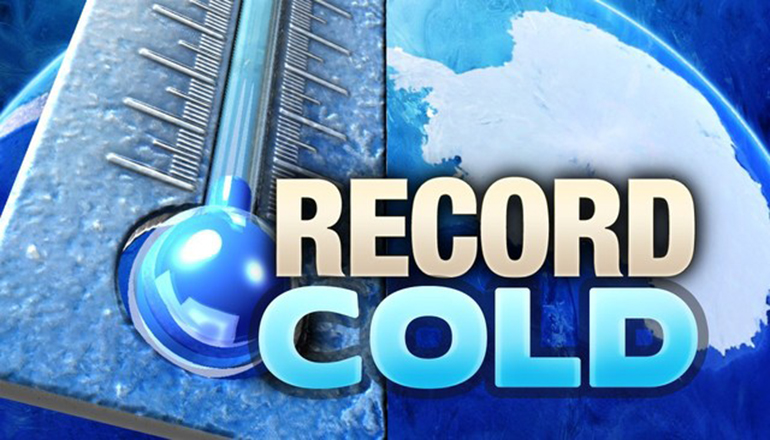As officials from the National Weather Service and the Federal Emergency Management Agency’s (FEMA) Region VII office continue monitoring the development of an arctic outbreak that could bring recording-setting cold temperatures to several cities throughout the Midwest, residents are encouraged to act now, preparing both their home and families for whatever may arise.
“We are watching the severe winter weather that that will be affecting the Midwest later this week, this will create dangerously cold wind chills and some cities will see their coldest temperatures in decades,” said FEMA Region VII Administrator Paul Taylor.
“Residents should take these conditions seriously and stay informed, Taylor added. “This bitter cold will be accompanied by strong winds at times Tuesday through Thursday. These types of life-threatening wind chills could lead to frostbite on exposed skin in a matter of minutes.
Visiting Ready.gov can help you and your family prepare for severe winter weather, to include this extreme cold we are about to experience.”
Take Protective Measures
Before Winter storms and extreme cold, develop or modify an existing family disaster plan to account for the winter weather-related hazards in your area.
Be familiar with the terms that are used to identify a winter storm hazard and discuss with your family what to do if a winter storm watch or warning is issued. Terms used to describe a winter storm hazard may include:
- Freezing Rain creates a coating of ice on roads and walkways.
- Sleet is rain that turns to ice pellets before reaching the ground. Sleet also causes roads to freeze and become slippery.
- Winter Weather Advisory means cold, ice and snow are expected.
- Winter Storm Watch means severe weather such as heavy snow or ice is possible in the next day or two.
- Winter Storm Warning means severe winter conditions have begun or will begin very soon.
Create an emergency supply kit that includes at least three days’ worth of food and water, a battery-powered or hand-crank radio and extra flashlights and batteries. Thoroughly check and update your family’s emergency supply kit and add the following supplies in preparation for winter weather:
- Rock salt to melt ice on walkways;
- Sand to improve traction;
- Snow shovels and other snow-removal equipment;
- Adequate clothing and blankets to help keep you warm.
Ensure your family preparedness plan and contacts are up-to-date. Practice your plan. Learn about the emergency plans that have been established in your area by your state and local government.
Make sure to think about a supply kit for your car as well because winter weather can hit when we are out and about to work, school and daily activities. Try to keep your gas tank as full as possible in case you are stuck on a highway for an extended period of time.
Emergency Response and Exercising Caution
After Winter Storms
Follow the instructions of state, local and tribal officials and listen to local radio or TV stations for updated emergency information. If you are told to stay off the roads, stay home, and when it is safe, check on your neighbors or friends nearby who may need assistance or extra support. Older adults and individuals who are dependent on life-sustaining medical equipment or assistive devices such as a ventilator or mobility devices may need additional support in areas that have lost power.
Important Tips to Remember:
- Severe winter weather can include snow or subfreezing temperatures, strong winds and ice or heavy rain storms. Avoid traveling by car, but if you must, make sure you have an emergency supply kit in the trunk of your car. Again, FEMA urges families to maintain an emergency supply kit both at home and in the car to help prepare for winter power outages and icy or impassable roads.
- Do not put your family at risk. Follow these important safety tips from the Consumer Product Safety Commission (CPSC), FEMA and the U.S. Fire Administration (USFA) in the aftermath of the storm:
- Portable Generators
Never use a generator inside a home, basement, shed or garage even if doors and windows are open. Keep generators outside and far away from windows, doors, and vents. Read both the label on your generator and the owner’s manual and follow the instructions. Any electrical cables you use with the generator should be free of damage and suitable for outdoor use.
- Charcoal Grills and Camp Stoves
Never use charcoal grills or camp stoves indoors. Deaths have occurred when consumers burned charcoal or used camp stoves in enclosed spaces, which produced lethal levels of carbon monoxide.
- CO Alarms
Install carbon monoxide alarms immediately outside each sleeping area and on every level of the home to protect against CO poisoning.
- Electrical Safety
Stay away from any downed wires, including cable TV feeds. They may be live with deadly voltage.
- Candles
Use caution with candles. If possible, use flashlights instead. If you must use candles, do not burn them on or near anything that can catch fire. Never leave burning candles unattended. Extinguish candles when you leave the room.
For more information and winter safety tips, please visit: https://www.ready.gov/winter-weather or www.listo.gov to find out how you can prepare your family for winter storms and other disasters.







